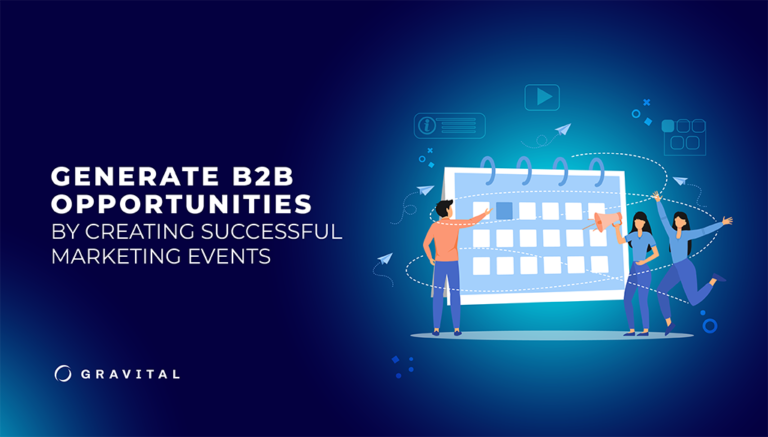Marketing events have become increasingly popular in recent years, as B2B companies have come to realize the value of these events in generating business opportunities. These platforms are particularly significant when personal interactions, relationship building and thought leadership are critical for business.
There are several reasons for the growing popularity of marketing events:
- Events provide a unique opportunity for B2B companies to connect with target audiences in person. This process allows businesses to establish and develop relationships with existing and potential customers and to showcase their products and services in a way that is not possible online.
- Marketing events also are a great way to generate leads by making it possible for B2B companies to collect contact information from potential customers. In addition, the companies can use events to qualify leads and nurture them through the sales funnel.
- Events help B2B brands raise brand awareness and position themselves company as industry leaders.
What Are Marketing Events?
Marketing events are diverse activities organized by companies for the purpose of marketing their products or services. The events typically aim to engage existing customers, attract potential customers and/or enhance brand visibility.
READ ALSO: THE POWER OF EMAIL MARKETING FOR B2B
Types of Marketing Events
Marketing events can take many different forms:
Trade Shows
These are large-scale events where multiple businesses in a specific industry showcase their products or services. Trade shows are excellent for networking, observing market trends and reaching prospective customers.
Webinars
Webinars are online seminars or workshops that are usually educational or informational. They can be used to demonstrate a product, teach about a particular topic or share industry insights.
Product Launches
These events celebrate the introduction of a new product or service to the market. They’re a good way to generate buzz and get people excited about what your company is offering.
Conferences
Conferences typically involve multiple guest speakers, panel discussions, workshops and networking sessions. Conferences can help companies establish thought leadership in an industry.
Networking Events
These events are specifically designed for professionals to meet and build relationships. They are usually less formal and provide a relaxed environment for individuals to connect.
Roundtables
Roundtable events are typically smaller, more intimate gatherings where industry leaders discuss specific topics. They’re great for facilitating deep conversations and building strong relationships.
Workshops
These are more hands-on, interactive events where participants learn by doing. Workshops can be used to teach potential customers how to use a product or to educate attendees about a particular topic.
Seminars
Seminars are typically smaller-scale events that focus on educating attendees about a specific topic. They are often used for thought leadership and brand positioning.
User Groups
These are meetings of users of a particular software or technology. They are very useful for obtaining feedback, providing user training and fostering a sense of community among users.
VIP Events
These are exclusive events for high-profile clients or partners. They’re a good way to build and strengthen relationships with key stakeholders.
Online/Virtual Events
These events take place online and can be anything from virtual meet-ups, online conferences, virtual trade shows or webinars. They became especially popular during the Covid-19 pandemic.
The type of event you choose should align with your business goals and audience preferences. Different events serve different purposes, so it’s important to choose the right type for your specific needs.


12 Tips To Boost B2B Business With Marketing Events
How can your business utilize marketing events to create more B2B opportunities? Here are some proven strategies.
1. Set Clear Goals
What do you hope to achieve by attending or hosting an event? Do you want to generate leads, build relationships or showcase your products or services? Once you know your goals, you can tailor your event accordingly.
2. Consider Your Target Audience
Target your event to the right audience. Not all events are created equal. If you want to generate business opportunities, you need to make sure that your event is targeted to the right audience. This means understanding your target customer personas and creating an event that will appeal to them.
3. Create a Compelling Value Proposition
What will attendees get out of your event? Make sure your value proposition is clear and persuasive.
4. Promote Your Event
Get the word out about your event to your target audience. Use a variety of channels to promote your event, including email, social media and paid advertising.
5. Host Thought Leadership Sessions
Share industry-specific knowledge and insights by hosting thought leadership sessions. For instance, if your company specializes in AI technology, host a seminar addressing its applications in business efficiency. Such an event can help position your brand as an industry authority, attracting potential B2B partners who value your expertise.
6. Network Intentionally
Marketing events offer numerous networking opportunities. Don’t just exchange business cards, but rather aim to understand other businesses’ challenges and how your product or service could be a solution. A trade show, for example, can be an ideal platform to initiate such solution-focused conversations.
7. Utilize Interactive Demonstrations
Interactive demonstrations can effectively showcase your product or service. If you offer a project management tool, for example, you can set up a live simulation where attendees can interact with it.
8. Leverage Digital Tools
Event apps and AI chatbots can enhance attendee experience, fostering interactions and engagement. Using a virtual event platform that enables networking opportunities among attendees can create potential B2B interactions.
9. Provide Value
Offering something of value to attendees, such as informative resources, content, unique insights or exclusive deals, attracts potential customers and fosters goodwill. The key is to provide content and promotions that are relevant and valuable to your target audience.
10. Keep It Engaging
Engage attendees throughout the event. Keep attendees engaged throughout your event with interactive activities, informative presentations and networking opportunities.
11. Make Connections
One of the main goals of attending or hosting a marketing event is to connect with potential customers and partners. Make it easy for attendees to connect with you by providing them with your contact information and by encouraging them to follow you on social media.
12. Follow Up Post Event
Don’t let the connection fade after the event. Reach out to the contacts you made during the event, thanking them for their time and expressing your interest in potential collaborations.
READ ALSO: HOW TO USE ROMI TO MEASURE THE EFFECTIVENESS OF YOUR MARKETING EFFORTS
Additional Tips
In addition to the tips listed above, here are a few other things to keep in mind when planning a B2B marketing event:
- Create and stick to your budget.
- Make sure your event is well-organized and executed–venue, schedule, audiovisual equipment, food and beverage, etc.
- Use social media to promote your event and generate excitement.
- Offer incentives to attendees, such as free gifts or discounts.
- Provide excellent customer service to attendees throughout the event.
- Collect feedback from attendees to improve your events in the future.
Example of Marketing Event:
A SaaS business launches a webinar series addressing common challenges in remote team management, a topical issue in the current business environment. The series, packed with expert speakers and valuable content, attracts many businesses facing similar problems. By demonstrating its understanding of contemporary business issues and showcasing how its software tackles them, the company manages to convert some of its attendees into clients.
Challenges of Marketing Events
Despite their potential, marketing events come with their challenges, including selecting the right event type, ensuring high-quality content and measuring the event’s success. Each of these challenges must be thoughtfully addressed to fully capitalize on the event’s potential.
Final Words
When used effectively, marketing events can be a potent tool for generating B2B business opportunities. They offer a unique combination of personal interaction, value delivery and branding that few other marketing strategies can match.
By following the tips above, you can ensure that your B2B marketing events are a success and help you achieve your marketing and business goals.
At Gravital, we know how to craft and execute marketing events that resonate with target audiences, increase brand visibility and generate valuable business opportunities. Reach out to us to discover how we can help elevate your B2B strategy with successful marketing events.


